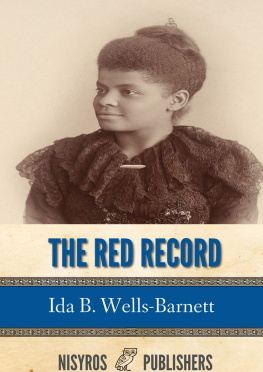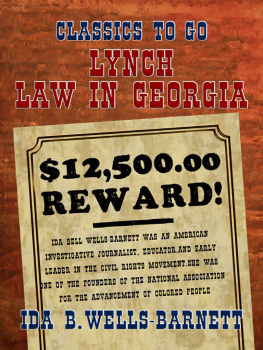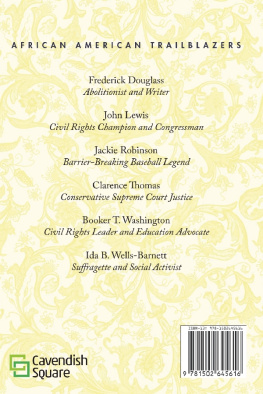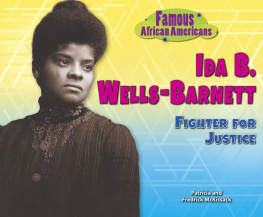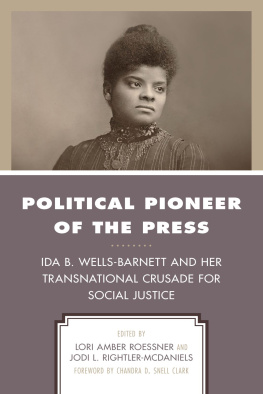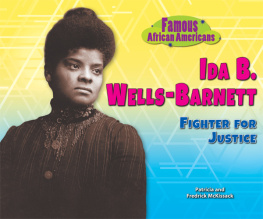PREFACE
HON. FREDERICK DOUGLASS'S LETTER
DEAR MISS WELLS:
Let me give you thanks for your faithful paper on the lynch abomination now generally practiced against colored people in the South. There has been no word equal to it in convincing power. I have spoken, but my word is feeble in comparison. You give us what you know and testify from actual knowledge. You have dealt with the facts with cool, painstaking fidelity, and left those naked and uncontradicted facts to speak for themselves.
Brave woman! you have done your people and mine a service which can neither be weighed nor measured. If the American conscience were only half alive, if the American church and clergy were only half Christianized, if American moral sensibility were not hardened by persistent infliction of outrage and crime against colored people, a scream of horror, shame, and indignation would rise to Heaven wherever your pamphlet shall be read.
But alas! even crime has power to reproduce itself and create conditions favorable to its own existence. It sometimes seems we are deserted by earth and Heavenyet we must still think, speak and work, and trust in the power of a merciful God for final deliverance.
Very truly and gratefully yours,
FREDERICK DOUGLASS
Cedar Hill, Anacostia, D.C.
THE CASE STATED
The student of American sociology will find the year 1894 marked by a pronounced awakening of the public conscience to a system of anarchy and outlawry which had grown during a series of ten years to be so common, that scenes of unusual brutality failed to have any visible effect upon the humane sentiments of the people of our land.
Beginning with the emancipation of the Negro, the inevitable result of unbribled power exercised for two and a half centuries, by the white man over the Negro, began to show itself in acts of conscienceless outlawry. During the slave regime, the Southern white man owned the Negro body and soul. It was to his interest to dwarf the soul and preserve the body. Vested with unlimited power over his slave, to subject him to any and all kinds of physical punishment, the white man was still restrained from such punishment as tended to injure the slave by abating his physical powers and thereby reducing his financial worth. While slaves were scourged mercilessly, and in countless cases inhumanly treated in other respects, still the white owner rarely permitted his anger to go so far as to take a life, which would entail upon him a loss of several hundred dollars. The slave was rarely killed, he was too valuable; it was easier and quite as effective, for discipline or revenge, to sell him "Down South."
But Emancipation came and the vested interests of the white man in the Negro's body were lost. The white man had no right to scourge the emancipated Negro, still less has he a right to kill him. But the Southern white people had been educated so long in that school of practice, in which might makes right, that they disdained to draw strict lines of action in dealing with the Negro. In slave times the Negro was kept subservient and submissive by the frequency and severity of the scourging, but, with freedom, a new system of intimidation came into vogue; the Negro was not only whipped and scourged; he was killed.
Not all nor nearly all of the murders done by white men, during the past thirty years in the South, have come to light, but the statistics as gathered and preserved by white men, and which have not been questioned, show that during these years more than ten thousand Negroes have been killed in cold blood, without the formality of judicial trial and legal execution. And yet, as evidence of the absolute impunity with which the white man dares to kill a Negro, the same record shows that during all these years, and for all these murders only three white men have been tried, convicted, and executed. As no white man has been lynched for the murder of colored people, these three executions are the only instances of the death penalty being visited upon white men for murdering Negroes.
Naturally enough the commission of these crimes began to tell upon the public conscience, and the Southern white man, as a tribute to the nineteenth-century civilization, was in a manner compelled to give excuses for his barbarism. His excuses have adapted themselves to the emergency, and are aptly outlined by that greatest of all Negroes, Frederick Douglass, in an article of recent date, in which he shows that there have been three distinct eras of Southern barbarism, to account for which three distinct excuses have been made.
The first excuse given to the civilized world for the murder of unoffending Negroes was the necessity of the white man to repress and stamp out alleged "race riots." For years immediately succeeding the war there was an appalling slaughter of colored people, and the wires usually conveyed to northern people and the world the intelligence, first, that an insurrection was being planned by Negroes, which, a few hours later, would prove to have been vigorously resisted by white men, and controlled with a resulting loss of several killed and wounded. It was always a remarkable feature in these insurrections and riots that only Negroes were killed during the rioting, and that all the white men escaped unharmed.
From 1865 to 1872, hundreds of colored men and women were mercilessly murdered and the almost invariable reason assigned was that they met their death by being alleged participants in an insurrection or riot. But this story at last wore itself out. No insurrection ever materialized; no Negro rioter was ever apprehended and proven guilty, and no dynamite ever recorded the black man's protest against oppression and wrong. It was too much to ask thoughtful people to believe this transparent story, and the southern white people at last made up their minds that some other excuse must be had.
Then came the second excuse, which had its birth during the turbulent times of reconstruction. By an amendment to the Constitution the Negro was given the right of franchise, and, theoretically at least, his ballot became his invaluable emblem of citizenship. In a government "of the people, for the people, and by the people," the Negro's vote became an important factor in all matters of state and national politics. But this did not last long. The southern white man would not consider that the Negro had any right which a white man was bound to respect, and the idea of a republican form of government in the southern states grew into general contempt. It was maintained that "This is a white man's government," and regardless of numbers the white man should rule. "No Negro domination" became the new legend on the sanguinary banner of the sunny South, and under it rode the Ku Klux Klan, the Regulators, and the lawless mobs, which for any cause chose to murder one man or a dozen as suited their purpose best. It was a long, gory campaign; the blood chills and the heart almost loses faith in Christianity when one thinks of Yazoo, Hamburg, Edgefield, Copiah, and the countless massacres of defenseless Negroes, whose only crime was the attempt to exercise their right to vote.



